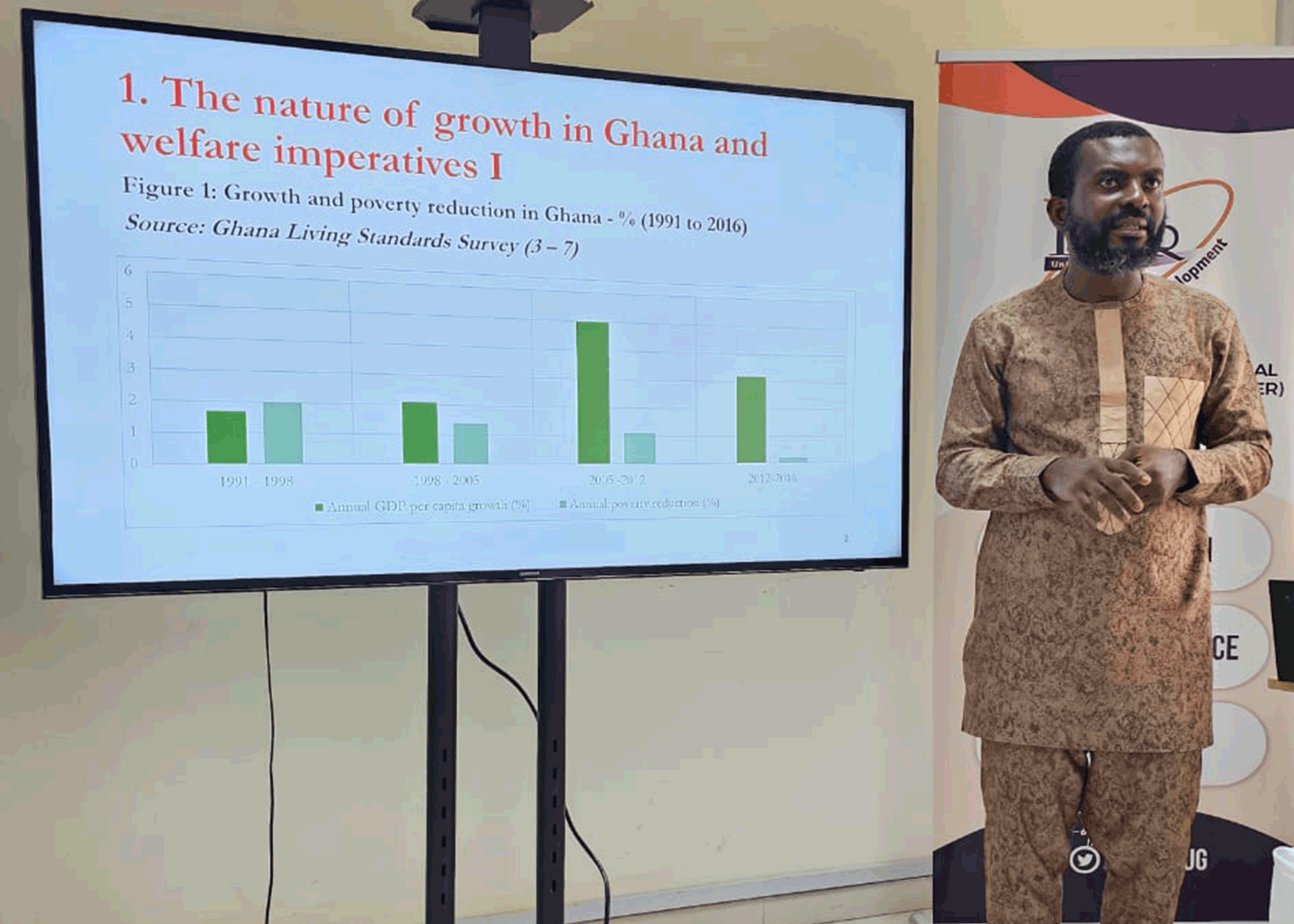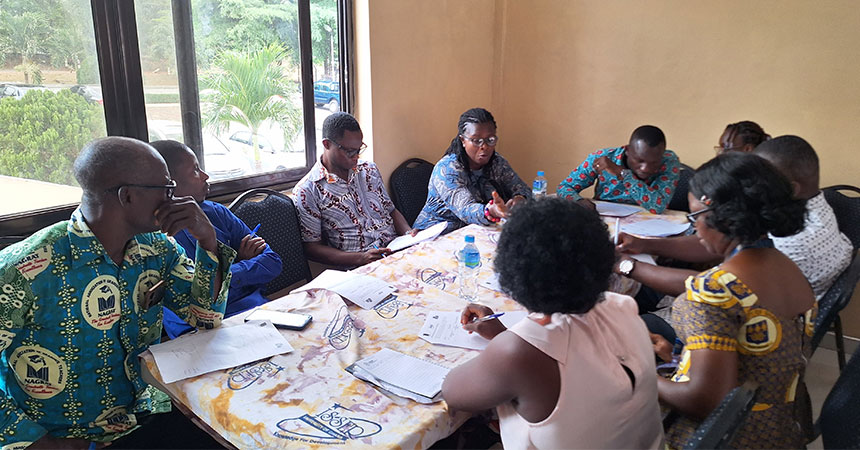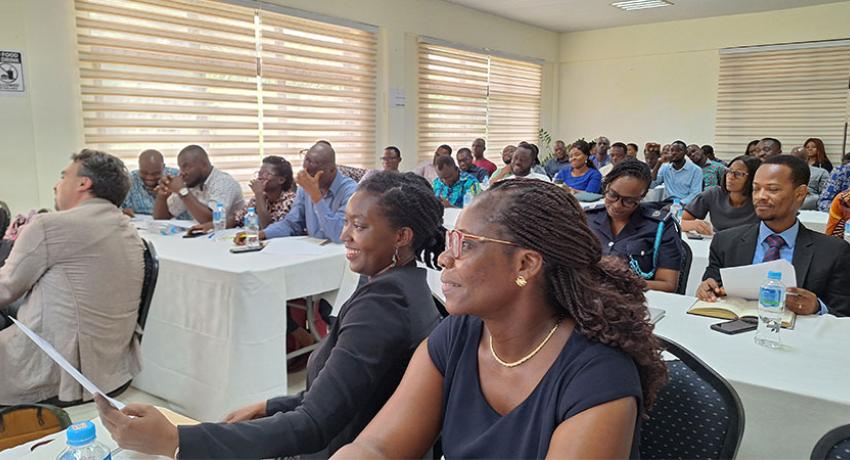Stakeholders from diverse public and private organizations attended the workshop, fostering inclusive and insightful discussions.
Researchers of the "Potential Impacts of Africa Continental Free Trade Agreement (AfCFTA) on Agri-food Sectors and Food Security in Ghana" project engaged stakeholders to share initial findings, gather feedback, and foster new insights. The forum attracted participants from diverse sectors of society, sparking discussions crucial to enhancing the research team's work. Moreover, attendees acquired research-based insights on AfCFTA, which proved invaluable in dispelling misconceptions and clarifying the ways various stakeholders can contribute to advancing Ghana's agriculture and food security objectives within the AfCFTA framework.
"When the AfCFTA was introduced to the farmers, some expressed mixed feelings regarding its potential benefits or challenges, but the research findings have clarified our initial thinking," remarked Charles Nyaaba, Executive Director of the Peasant Farmers' Association of Ghana (PFAG). He expressed hope for increased opportunities for farmer involvement in similar workshops.
Joyce Kporvie, from the Research Department of Ghana Exim Bank, also shared feedback, highlighting the collaborative potential between researchers and industry stakeholders. She spoke about the importance of the research findings in directing her organization’s efforts to identify areas of collaboration to mitigate trade barriers within the African continent.
 Joyce Kporvie from Ghana Exim Bank was among several participants who shared positive feedback on the workshop's content and organization.
Joyce Kporvie from Ghana Exim Bank was among several participants who shared positive feedback on the workshop's content and organization.
The project, aimed at shedding light on the effects of the AfCFTA on Ghana's agricultural and food sectors, is timely given the nation's socio-economic landscape and its recent ratification of the trade agreement.
"As we navigate the complexities of trade liberalization under AfCFTA, ensuring food security and safeguarding the interests of Ghana’s farmers and consumers is paramount," stated Dr. Andrew Agyei-Holmes, ISSER Senior Research Fellow, and Principal Investigator of the project.
"Our research aims to empower policymakers with the knowledge and tools necessary to navigate the challenges and opportunities presented by AfCFTA to help the country reap the full benefits of regional economic integration," he added, emphasizing the critical role of agriculture and food security in Ghana's socio-economic development.
Highlights of the findings
 Dr. Agyei-Holmes' presentation covered topics such as the nature of growth in Ghana and welfare imperatives, Ghana's trade with AU, and preliminary results of AfCFTA. This was preceded by a presentation from EU-JRC's Emanuele Ferrari on EU-JRC's AfCFTA activities and the DEMETRA model.
Dr. Agyei-Holmes' presentation covered topics such as the nature of growth in Ghana and welfare imperatives, Ghana's trade with AU, and preliminary results of AfCFTA. This was preceded by a presentation from EU-JRC's Emanuele Ferrari on EU-JRC's AfCFTA activities and the DEMETRA model.
Ghana's economy has witnessed shifts in sectoral contributions over the years, with agriculture, industry, and services playing crucial roles. Despite the decline in the agricultural sector's contribution to GDP, it remains a significant source of employment. However, issues such as undernourishment, economic inequalities and poverty persist, highlighting the importance of food security measures. The implementation of AfCFTA will remove tariffs for 97% of all tariff lines and not less than 90% of all intra-African trade.
Using the Dynamic Equilibrium Model for Economic Development Resources and Agriculture (DEMETRA), the “Potential Impacts of Africa Continental Free Trade Agreement (AfCFTA) on Agri-food Sectors and Food Security in Ghana” project is examining various scenarios of reducing import tariffs on agri-food products for Ghana and other African Union (AU) member states.
Contrary to previous studies, the initial findings of the study reveal that even with tariff-only liberalization, the effects on Ghana's economy are substantial. Specifically, tariff-only liberalization is predicted to lead to a notable increase in Ghana's GDP, ranging between 0.31% and 0.35%, by 2035. Additionally, there is a pronounced effect on aggregate supply, with estimates ranging from 2.51% to 2.71% by the same year. The study also indicates positive impacts on trade, with exports projected to expand between 4.36% and 4.86%, while imports are expected to increase by 5.57% to 5.80%.
Notably, a full liberalization of agricultural trade under the tariff-only schedule is expected to drive increases in exports of cash crops by 2035 compared to the baseline. In addition, consumption effects of tariff-only liberalization are deemed positive for all commodities, with some variations specific to product categories.
Participants acknowledged for continued engagement and support for research activities
 Breakout sessions provided an opportunity for participants to delve deeper into the presentations, discussing and outlining responses to assigned questions.
Breakout sessions provided an opportunity for participants to delve deeper into the presentations, discussing and outlining responses to assigned questions.
ISSER Director Prof. Peter Quartey gave welcome remarks where he thanked the participants for their continued support for the Institute’s research activities. He reminded them of the importance of their insights and experiences in enriching and raising the relevance of research and urged them to participate actively in the discussions.
Held on February 14 at ISSER, the workshop provided a platform for stakeholders from various public and private organizations to engage with the research findings and reflect on their implications for Ghana's agri-food sectors amid AfCFTA implementation.
As Dr. Neina Dora, a participant from the Soil Science Department of the University of Ghana commented, “The results seem to be like a warning system to force us to think much faster than we would have thought.” She commended the workshop's organization and diverse representation, noting its significance in fostering informed decision-making.
Organizations represented at the forum included the European Commission, PFAG, COCOBOD, Ghana Revenue Authority, and National Development Planning Commission (NDPC). The others are International Fertilizer Development Center (IFDC), Forum for Agricultural Research (FARA), Ghana Exim Bank, and Ecobank Ghana.
For inquiries about this project, please contact, the lead researcher, Dr. Andrew Agyei-Holmes at andy.agyeiholmes@gmail.com
- Log in to post comments

